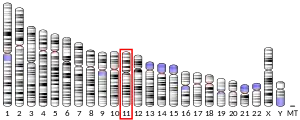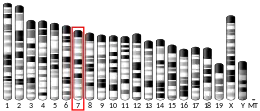Plakophilin-3
Plakophilin-3 is a protein that in humans is encoded by the PKP3 gene.[5][6]
| PKP3 | |||||||||||||||||||||||||||||||||||||||||||||||||||
|---|---|---|---|---|---|---|---|---|---|---|---|---|---|---|---|---|---|---|---|---|---|---|---|---|---|---|---|---|---|---|---|---|---|---|---|---|---|---|---|---|---|---|---|---|---|---|---|---|---|---|---|
| Identifiers | |||||||||||||||||||||||||||||||||||||||||||||||||||
| Aliases | PKP3, plakophilin 3 | ||||||||||||||||||||||||||||||||||||||||||||||||||
| External IDs | OMIM: 605561 MGI: 1891830 HomoloGene: 5200 GeneCards: PKP3 | ||||||||||||||||||||||||||||||||||||||||||||||||||
| |||||||||||||||||||||||||||||||||||||||||||||||||||
| |||||||||||||||||||||||||||||||||||||||||||||||||||
| |||||||||||||||||||||||||||||||||||||||||||||||||||
| |||||||||||||||||||||||||||||||||||||||||||||||||||
| |||||||||||||||||||||||||||||||||||||||||||||||||||
| Wikidata | |||||||||||||||||||||||||||||||||||||||||||||||||||
| |||||||||||||||||||||||||||||||||||||||||||||||||||
Function
This gene encodes a member of the arm-repeat (armadillo) and plakophilin gene families. Plakophilin proteins contain numerous armadillo repeats, localize to cell desmosomes and nuclei, and participate in linking cadherins to intermediate filaments in the cytoskeleton. This protein may act in cellular desmosome-dependent adhesion and signaling pathways.[6]
References
- GRCh38: Ensembl release 89: ENSG00000184363 - Ensembl, May 2017
- GRCm38: Ensembl release 89: ENSMUSG00000054065 - Ensembl, May 2017
- "Human PubMed Reference:". National Center for Biotechnology Information, U.S. National Library of Medicine.
- "Mouse PubMed Reference:". National Center for Biotechnology Information, U.S. National Library of Medicine.
- Schmidt A, Langbein L, Prätzel S, Rode M, Rackwitz HR, Franke WW (Jun 1999). "Plakophilin 3--a novel cell-type-specific desmosomal plaque protein". Differentiation. 64 (5): 291–306. doi:10.1046/j.1432-0436.1999.6450291.x. PMID 10374265.
- "Entrez Gene: PKP3 plakophilin 3".
- Bonné S, Gilbert B, Hatzfeld M, Chen X, Green KJ, van Roy F (Apr 2003). "Defining desmosomal plakophilin-3 interactions". J. Cell Biol. 161 (2): 403–16. doi:10.1083/jcb.200303036. hdl:1854/LU-210987. PMC 2172904. PMID 12707304.
Further reading
- Maruyama K, Sugano S (1994). "Oligo-capping: a simple method to replace the cap structure of eukaryotic mRNAs with oligoribonucleotides". Gene. 138 (1–2): 171–4. doi:10.1016/0378-1119(94)90802-8. PMID 8125298.
- Suzuki Y, Yoshitomo-Nakagawa K, Maruyama K, Suyama A, Sugano S (1997). "Construction and characterization of a full length-enriched and a 5'-end-enriched cDNA library". Gene. 200 (1–2): 149–56. doi:10.1016/S0378-1119(97)00411-3. PMID 9373149.
- Bonné S, van Hengel J, Nollet F, Kools P, van Roy F (1999). "Plakophilin-3, a novel armadillo-like protein present in nuclei and desmosomes of epithelial cells". J. Cell Sci. 112 (14): 2265–76. doi:10.1242/jcs.112.14.2265. hdl:1854/LU-113819. PMID 10381383.
- Hofmann I, Mertens C, Brettel M, Nimmrich V, Schnölzer M, Herrmann H (2000). "Interaction of plakophilins with desmoplakin and intermediate filament proteins: an in vitro analysis". J. Cell Sci. 113 (13): 2471–83. doi:10.1242/jcs.113.13.2471. PMID 10852826.
- Bonné S, Gilbert B, Hatzfeld M, Chen X, Green KJ, van Roy F (2003). "Defining desmosomal plakophilin-3 interactions". J. Cell Biol. 161 (2): 403–16. doi:10.1083/jcb.200303036. PMC 2172904. PMID 12707304.
- Papagerakis S, Shabana AH, Depondt J, Gehanno P, Forest N (2003). "Immunohistochemical localization of plakophilins (PKP1, PKP2, PKP3, and p0071) in primary oropharyngeal tumors: correlation with clinical parameters". Hum. Pathol. 34 (6): 565–72. doi:10.1016/S0046-8177(03)00174-6. PMID 12827610.
- Beausoleil SA, Jedrychowski M, Schwartz D, Elias JE, Villén J, Li J, Cohn MA, Cantley LC, Gygi SP (2004). "Large-scale characterization of HeLa cell nuclear phosphoproteins". Proc. Natl. Acad. Sci. U.S.A. 101 (33): 12130–5. Bibcode:2004PNAS..10112130B. doi:10.1073/pnas.0404720101. PMC 514446. PMID 15302935.
- Benzinger A, Muster N, Koch HB, Yates JR, Hermeking H (2005). "Targeted proteomic analysis of 14-3-3 sigma, a p53 effector commonly silenced in cancer". Mol. Cell. Proteomics. 4 (6): 785–95. doi:10.1074/mcp.M500021-MCP200. PMID 15778465.
- Zhang Y, Wolf-Yadlin A, Ross PL, Pappin DJ, Rush J, Lauffenburger DA, White FM (2005). "Time-resolved mass spectrometry of tyrosine phosphorylation sites in the epidermal growth factor receptor signaling network reveals dynamic modules". Mol. Cell. Proteomics. 4 (9): 1240–50. doi:10.1074/mcp.M500089-MCP200. PMID 15951569.
- Hofmann I, Casella M, Schnölzer M, Schlechter T, Spring H, Franke WW (2006). "Identification of the junctional plaque protein plakophilin 3 in cytoplasmic particles containing RNA-binding proteins and the recruitment of plakophilins 1 and 3 to stress granules". Mol. Biol. Cell. 17 (3): 1388–98. doi:10.1091/mbc.E05-08-0708. PMC 1382326. PMID 16407409.
- Beausoleil SA, Villén J, Gerber SA, Rush J, Gygi SP (2006). "A probability-based approach for high-throughput protein phosphorylation analysis and site localization". Nat. Biotechnol. 24 (10): 1285–92. doi:10.1038/nbt1240. PMID 16964243. S2CID 14294292.
- Aigner K, Descovich L, Mikula M, Sultan A, Dampier B, Bonné S, van Roy F, Mikulits W, Schreiber M, Brabletz T, Sommergruber W, Schweifer N, Wernitznig A, Beug H, Foisner R, Eger A (2007). "The transcription factor ZEB1 (deltaEF1) represses Plakophilin 3 during human cancer progression". FEBS Lett. 581 (8): 1617–24. doi:10.1016/j.febslet.2007.03.026. PMC 2938730. PMID 17391671.
This article is issued from Wikipedia. The text is licensed under Creative Commons - Attribution - Sharealike. Additional terms may apply for the media files.





